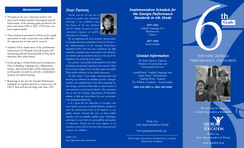Assessment
Throughout the year, classroom teachers will assess each student's growth and progress toward achievement of the learning goals specified in the state curriculum (GPS or QCC if GPS have not been implemented).
These classroom assessments will be used to guide instruction in order to provide every child with the opportunity to learn and to succeed.
Students will be made aware of the performance expectations for 6th grade and will acquire selfmonitoring and self-assessing skills to help them maximize their achievement.
In the spring, Criterion-Referenced Competency Tests in Reading, Language Arts, Mathematics, Science, and Social Studies will be administered to 6th graders in order to provide a standardized measure of student learning.
Beginning in the year the Georgia Performance Standards are implemented for a content area, the CRCT Tests will directly align with those GPS.
Dear Parents,
Thank you for all you do as parents to guide your children's learning! I am confident that the future of all our children will be bright because of your continued support of public education in Georgia.
We are beginning the most extensive improvement in Georgia education undertaken in the last 18 years-- the implementation of the Georgia Performance Standards (GPS). The new state curriculum sets high standards, maintains clear expectations, and will place our schools and our students not just at the top of the Southeast, but at the top of the nation.
As a parent, I personally understand that this kind of change may generate questions and concerns: Why do we need a change? How will this impact my child? What will be different in my child's classroom?
For this reason, I have made communication and keeping you informed an absolute priority. Georgia's teachers and administrators have been preparing for this change, and they will be able to answer many of your questions at your local schools. I also encourage you to visit the Georgia Department of Education website to find out more about the new curriculum: www.georgiastandards.org.
It is a great day for education in Georgia. Like never before, our state is unified behind a mission to raise the achievement level of all students in our public schools. Toward this aim, we have rallied together and successfully tackled many challenges, ushering in a new level of accountability and quality in education. Thank you for your support as we continue to raise the bar for our state's most precious resource, our children.
Kathy Cox, State Superintendent of Schools
Implementation Schedule for the Georgia Performance Standards in 6th Grade
2005-2006 English Language Arts
Mathematics Science
2007-2008 Social Studies
Contact Information
Dr. Eloise Barron, Director Division of Curriculum and
Instructional Services Gerald Boyd - English Language Arts
Claire Pierce - Mathematics Stephen Pruitt - Science
Dr. William Cranshaw - Social Studies (404) 656-4059 or (404) 656-2608
Kathy Cox, State Superintendent of Schools www.georgiastandards.org
The Georgia Department of Education is an Equal Opportunity Employer
6th Grade
THE NEW GEORGIA PERFORMANCE STANDARDS
We will lead the nation in improving student achievement.
Kathy Cox, State Superintendent of Schools
www.gadoe.org
6th Grade Language Arts
Sixth grade students will receive instruction in reading, writing, and listening, speaking & viewing. By the end of 6th grade, students will be able to:
Use oral and written language, media, and technology for expressive, informational, argumentative, critical, and literary purposes
Determine specific areas of interest and engage in personal reading
Analyze their own writing in order to revise what they say and how they say it
Employ distinctive voice and style in writing
Proof their own writing and edit to conform to basic conventions of Standard English
Convey opinions through oral communication, role-play, or performances
Apply specific guidelines to evaluate content and strategies in listening, speaking, and viewing assignments
6th Grade Mathematics
All students will be actively engaged in developing mathematical understandings in real and relevant contexts. By the end of 6th grade, students will be able to:
Understand the four arithmetic operations as they relate to positive rational numbers
Compute with and convert between different forms of positive rational numbers
Understand the concepts of ratio and proportion, and solve problems using proportional reasoning
Understand and use line and rotational symmetry
Determine the surface area and volume of solid figures
Use variables to represent unknown quantities in formulae, algebraic expressions, and equations
Utilize data to make predictions
Determine the probability of a given event
6th Grade Science
Sixth grade students will employ inquiry, research, and investigation to study Earth Science. By the end of 6th grade, students will be able to:
Collect, use, and analyze scientific data related to the earth's processes
Use different models to represent systems such as the solar system and the sun/moon/earth system
Record observations about the earth's materials and use these observations as the basis for inferences about the formation of the earth
Describe observations and report information in graphical form about the earth's processes
Recognize relationships between simple charts and graphs and develop strategies for interpreting findings about the earth's processes
Replicate investigations related to the earth's processes and compare and contrast different results
6th Grade Social Studies
Sixth grade students will study the history, geography, political structures, and economics of Latin America & Canada, Europe, Australia & Oceania. By the end of 6th grade, students will be able to:
Explain major historical developments leading to and of 20th & 21st century Latin America & Canada, Europe, Australia & Oceania
Explain the impact of location, climate, physical characteristics, natural resources, and population size on these regions of the modern world
Describe the cultural characteristics of Latin America & Canada, Europe, Australia & Oceania
Describe the impact of governmental policies and individual behaviors on these regions of the modern world
Describe different economic systems and economic policies as they relate to these regions of the modern world
Explain concepts of personal money management
